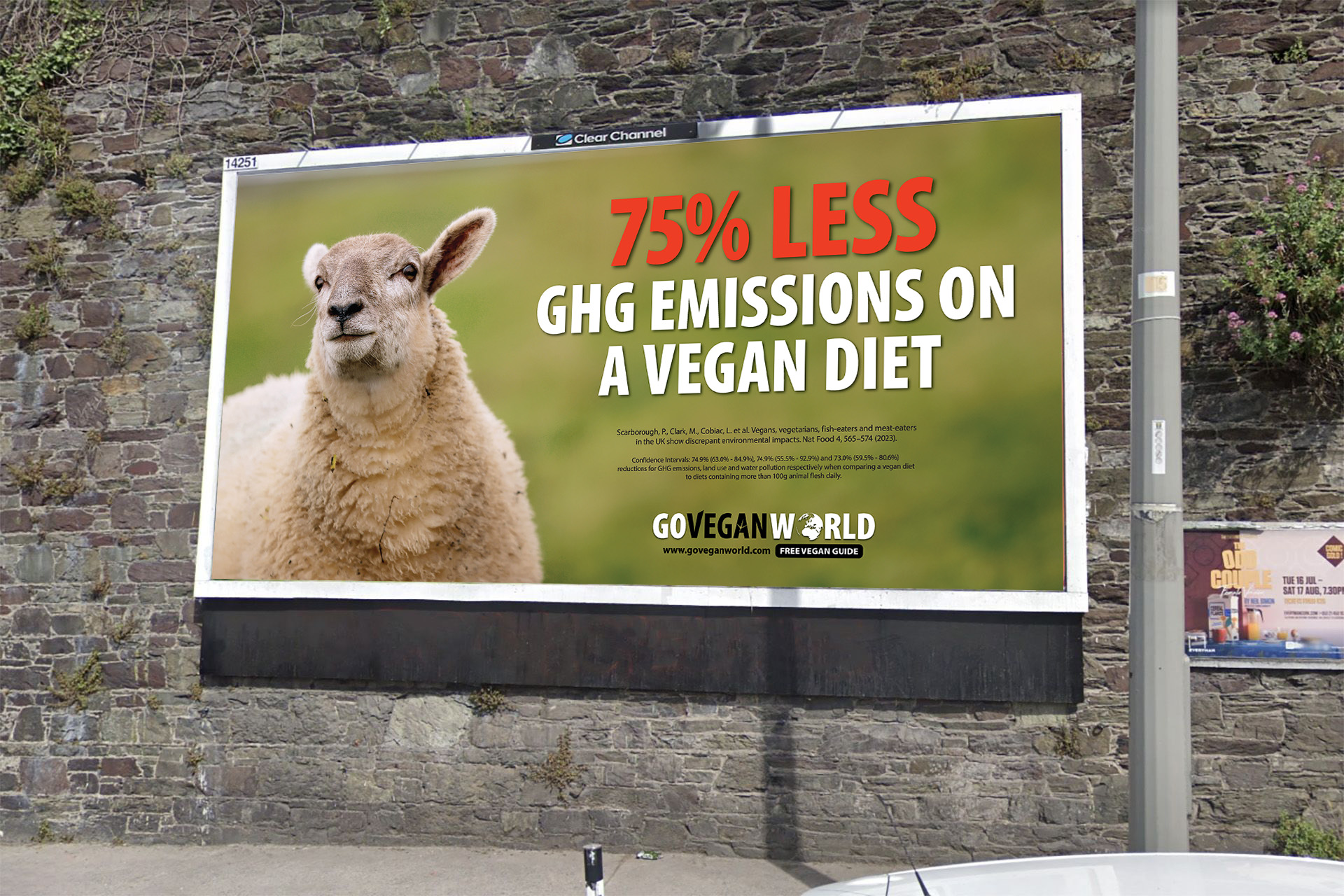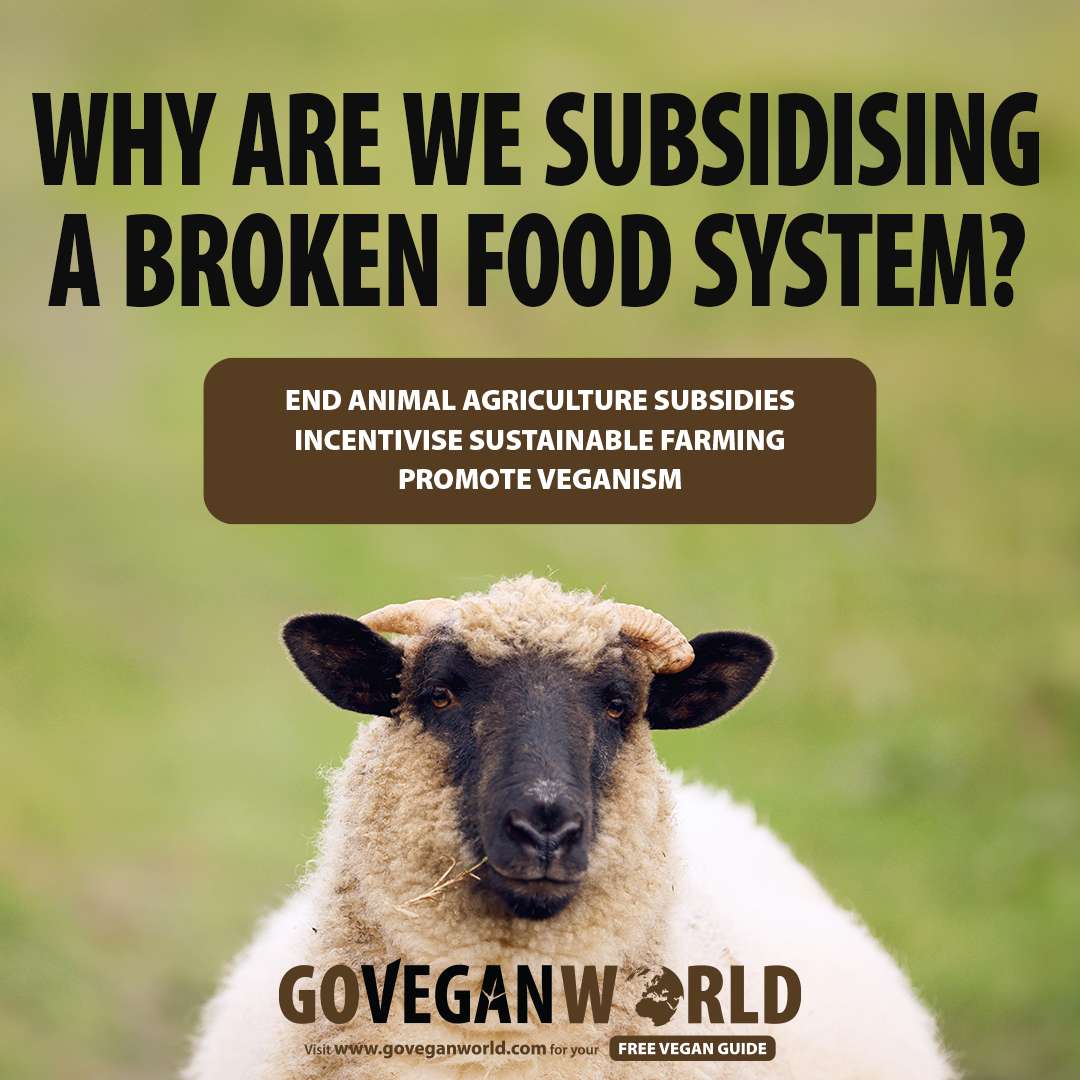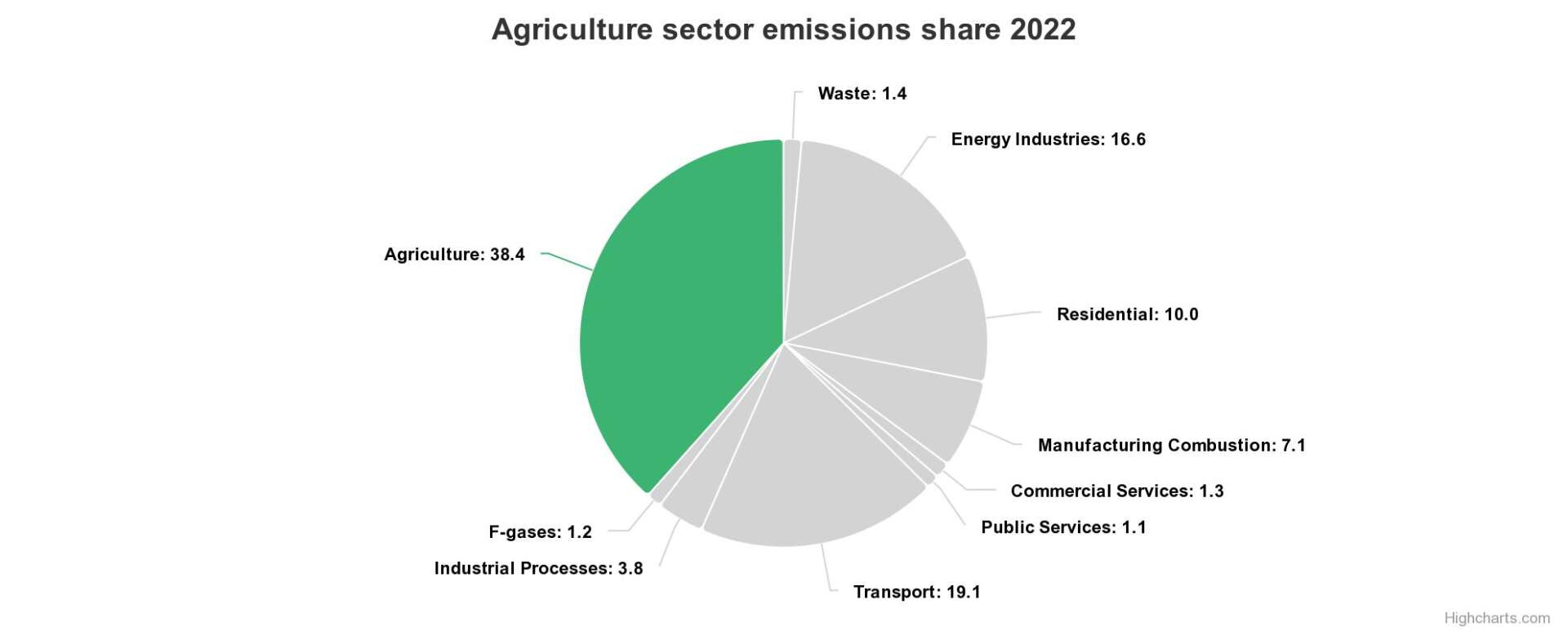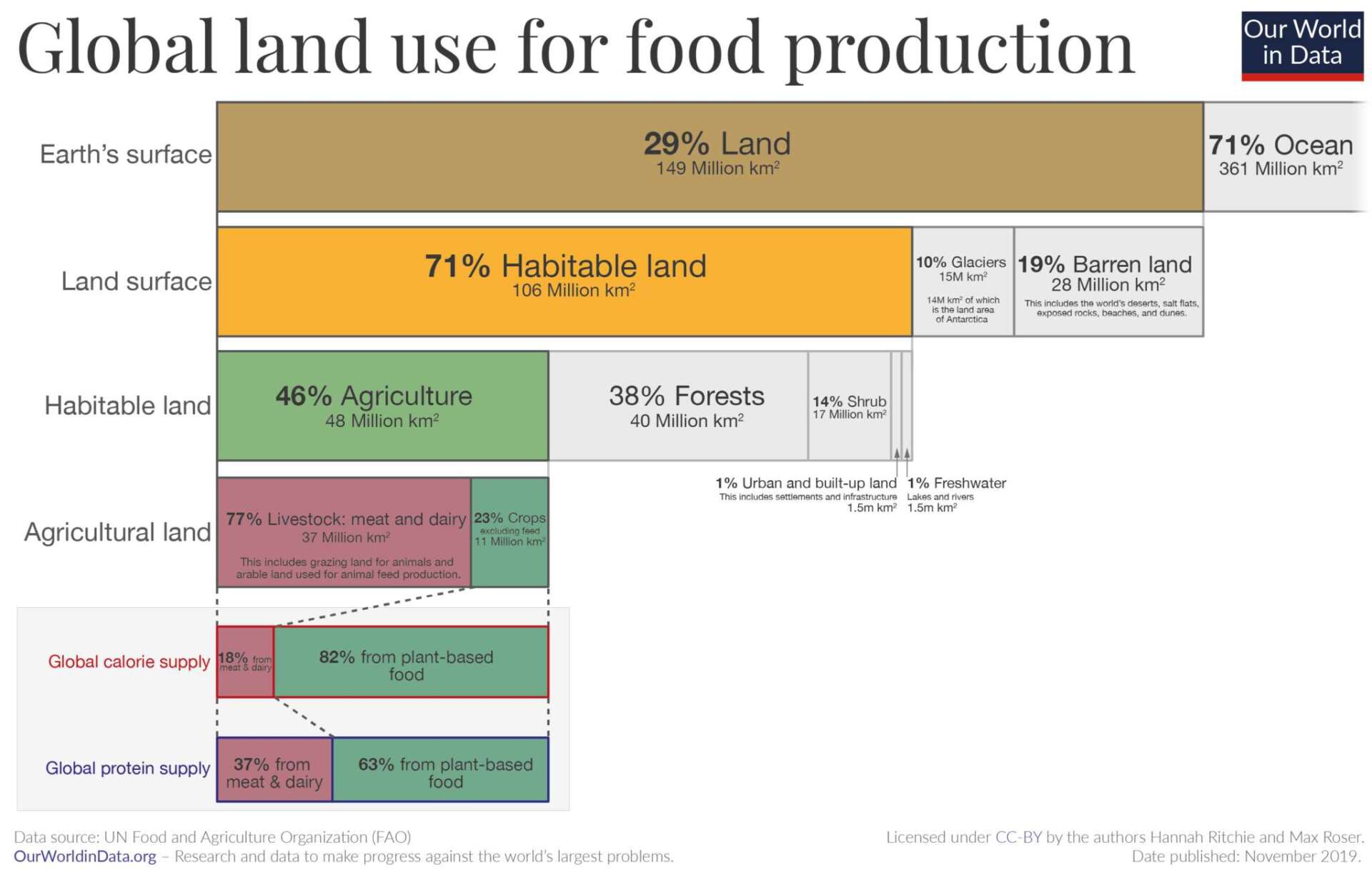Tilly is a special sheep. She was rescued a few years ago when she was found wandering around a village in Co Donegal when she was only a few months old. She has a very engaging face and looks us right in the eye. She was chosen to represent our Go Vegan World New Year 2024 campaign with its focus on the damage animal agriculture causes to the environment and its contribution to climate change. We question why we are subsidising a broken food system that has no advantages whatsoever to humans or other animals, with the exception of the few who profit from misery and destruction.
Why Are We Subsidising a Broken Food System?
Animal agriculture uses 77% of global farmland, yet it only produces 18% of the world’s calories and 37% of the total protein (Poore and Nemecek, 2018).
“Less than a quarter of agricultural subsidies are used to grow the kinds of foods that are good for human health and the environment, and which a healthy and sustainable food system would need much more of: fruits, vegetables, legumes and nuts.” (Springmann et al 2022).
Agricultural Subsidies
Animal agriculture would not exist without subsidies and those subsidies favour the status quo of animal farming at the expense of plant based alternatives. A recent analysis of lobbying, subsidies and regulations showed that farmers farming animals in the EU received 1,200 times more public funding than plant-based food groups. In the US, animal farmers got 800 times more public funding than plant based production.
Marco Springmann describes the subsidies system in a recent article:
“Agricultural subsidies help prop up a food system that is neither healthy nor sustainable. Worldwide, more than US$200 billion of public money (that is, money collected through taxes) is given to farmers every year in direct transfers – usually with the intention of supporting national food production and supply. Less than a quarter of agricultural subsidies are used to grow the kinds of foods that are good for human health and the environment, and which a healthy and sustainable food system would need much more of: fruits, vegetables, legumes and nuts.” Marco Springmann et al, 2022.
Why Are So Few People Vegan?
Most people are not vegan but they might be vegan if they received accurate information on its benefits, as well as practical information on how to be vegan.
Currently, over 90% of people in the Western World (probably around 97 or 98%) consume animal products. That is because the animal agriculture industry invests large amounts of funding in campaigns designed to maintain the consumption of animal products which they promote as normal, necessary, and nice. Most of us grew up believing that hens just lay eggs, cows magically make milk, and that animal products are essential for human health, all of which are myths sold to us by an industry that misleads a public that is ignorant of animal agricultural practices and what constitutes optimal human nutrition. With the exception of the tobacco industry, we cannot think of any other industry that has sold such blatant untruths and got away with it.
In the era of dawning recognition of climate heating and environmental destruction, the animal agriculture industry promotes its products as environmentally beneficial. People believe them, despite warnings of dire consequences if we do not change how we live. The industry in Ireland (and in other countries) advertises itself as ‘the most carbon efficient in Europe’. Our government officials are heavily influenced by the industry and, unfortunately, repeat these myths which are believed by the public that has faith in them. In fact, the very opposite to these myths seems to be the case. Some studies show that Ireland is one of the most carbon-intensive cow flesh producers in Europe and the third most intensive dairy producer.
In 2019, An Táisce used data from the United Nations Food and Agriculture Organisation (FAO)’s Global Livestock Environmental Assessment Model (GLEAM) to show that Ireland was the most carbon-intensive producer of beef and third most carbon intensive producer of dairy in the EU. Despite boasting about being a grass-based system, Irish animal agriculture relies on significant amounts of imported grain. Furthermore, the grass based system is not the solution it claims to be: a recent study found that it has a 42% higher carbon footprint than the grain based system.
A recent finding by the Advertising Standards Authority in Ireland (ASAI) found the Irish National Dairy Council (NDC)’s advertisements claiming that Irish dairy is environmentally friendly, was ‘greenwashing’ and in breach of the Advertising Standards on several grounds including being Misleading, Failure to Substantiate, and Exploiting the credulity, inexperience and/or lack of knowledge of consumers. If you are not vegan, that’s you they are referring to.
The advertising campaigns are very obvious. More insidious is the influence on families and young children through information targeted at new mothers through infant formula and baby foods promotion, and at school children through farm education and school milk programmes.
The industry invests considerable effort into denigrating vegans and vegan alternatives and suppresses the development of plant-based alternatives to animal products. A study at Stanford University recently demonstrated what most of us in the animal rights movement already knew: the “gigantic” power of the meat and dairy industries in the EU and US is blocking the development of the greener alternatives needed to tackle the climate, environmental and health crisis.
“The power of the animal farming sector, both in the US and in Europe, and the political influence they have is just gigantic,” said Prof Eric Lambin, who conducted the study with Dr Simona Vallone, both at Stanford University, US.
The researchers concluded that “powerful vested interests exerted their political influence to maintain the system unchanged and to obstruct competition created by technological innovations”.
Lambin said: “We found that the amazing obstacles to the upscaling of the alternative technologies relates to public policies that still massively fund the incumbent system, when we know it’s really part of the problem in terms of climate change, biodiversity loss and some health issues.”
Another recent report examined the backlash on social media against posts about the truth of producing and consuming animal products. It analysed almost 1 million pieces of information and showed how misinformation attacks alternative proteins, undermines climate and dietary science, promotes conspiracies and exaggerates the benefits of animal products (Truth, lies and culture wars, Changing Markets, 2023).
Animal Agriculture’s Link to Climate Heating, Environmental Destruction & Illness
Animal agriculture is a major cause of global heating, as well as being a significant contributor to diet related diseases among the millions of people who suffer unnecessarily and die prematurely. There is a growing awareness that plant-based diets have immense health benefits, as well as being the most sustainable way to eat. There is a key role for medical professionals and dietitians to ensure that they educate and promote sustainable dietary patterns that are healthy and fair: that means well planned, plant-based diets.
Most public discourse about climate change and environmental destruction is about fossil fuels. Understandably then, people imagine that the most effective behavioural change they could make is to reduce their transport and energy use emissions. However, it is essential that we change how we eat as well as reducing our transport and energy emissions. Unless we replace animal products with plant based diets, we will not avoid dangerous levels of climate warming that will result in conditions in which we will struggle to produce any food at all.
The easiest thing that every individual can do to reduce their environmental impact, right now, at no extra cost, and without necessitating government grants or incentives, is to transition to a vegan diet.
Go Vegan World’s 2024 New Year campaign in Ireland aims to cast a light on the immense impact every individual can have if they become vegan.

A Vegan Diet Reduces our Environmental Impact More than Reducing Flights or Driving an Electric Car
Consuming a vegan (100% plant-based) diet, reduces our environmental impact significantly more than cutting down on flights or driving an electric car. That fact is surprising to most people because the role that the production and consumption of animal products plays in climate change and environmental destruction is vastly under-represented.
The global food system emits a third of GHG emissions (range 25% to 42% for the year 2015) (Crippa et al, 2021). Agricultural Emissions in Ireland are estimated to be 38.4%.
Agriculture was responsible for 38.4% of greenhouse gas emissions in Ireland in 2022.
Source: https://www.epa.ie/our-services/monitoring–assessment/climate-change/ghg/agriculture/
GHG emissions are not the only problem associated with animal agriculture and a non-vegan diet. The global food system also uses 70% of the world’s fresh water (du Plessis, A, 2022; FAO, 2011) and causes 80% of river and lake pollution (Poore and Nemecek (2018).
Most of the harm is caused by animal agriculture which exists to feed the demand for fish, flesh, eggs, dairy, and non-food products such as wool and leather.
Animal agriculture uses 77% of global farmland, yet it only produces 18% of the world’s calories and 37% of the total protein (Poore and Nemecek, 2018).
It raises the question as to why the production and consumption of animal foods, which is so unethical and has so many disadvantages, is being subsidised and supported rather than plant foods.
Let’s look at the difference we could make if we transitioned to plant based production and consumption
The Difference Your Diet Can Make
Recent research shows that a vegan (100% plant based-diet) results in 75% less emissions, water pollution and land use than non-vegan diets (diets containing more than 100g animal flesh daily). The research also shows that a vegan diet cuts the destruction of wildlife by 66% and water use by 54% (Scarborough et al, 2023).
Going vegan is relatively easy. The short-term inconvenience involved in learning why we should be vegan, what products are vegan friendly, and the nutritional components of a healthy plant based diet, are minor in comparison to the many benefits of being vegan.
It is no longer a choice. When you look at the facts, being vegan is an essential component of addressing climate chaos and environmental destruction. It is our only hope of correcting the myth of human supremacy that has got us (and other animals) into this nightmare in the first place.
References:
Anja du Plessis, Persistent degradation: Global water quality challenges and required actions, One Earth, Volume 5, Issue 2, 2022, Pages 129-131.
ASAI, Bulletin 23/6, Batch 289, Reference 41803, https://www.asai.ie/complaint/food-non-alcoholic-beverages-13/ Accessed 27th December 2023)
Gibbons, J (2019) Bombshell for Irish Beef, Dairy Sectors on Carbon Emissions, John Gibbons, An Taisce.
Crippa, M., Solazzo, E., Guizzardi, D. et al. Food systems are responsible for a third of global anthropogenic GHG emissions. Nat Food 2, 198–209 (2021). https://doi.org/10.1038/s43016-021-00225-9.
FAO. (2011). The state of the world’s land and water resources for food and agriculture (SOLAW) – Managing systems at risk. Food and Agriculture Organization of the United Nations, Rome and Earthscan, London in https://ourworldindata.org/environmental-impacts-of-food.
Journal.ie FactFind: Are Irish farmers the ‘most carbon-efficient food producers in the world’? 24 July 2022. https://www.thejournal.ie/factcheck-irish-beef-and-dairy-emissions-5823435-Jul2022/ (Accessed 26th December, 2022)
https://www.thejournal.ie/overseas-impact-soy-imports-deforestation-6248437-Dec2023/
https://phys.org/news/2023-12-beef-farming-cattle-lifelong-grass.html
Poore, J., & Nemecek, T. (2018). Reducing food’s environmental impacts through producers and consumers. Science, 360(6392), 987-992.
Scarborough, P., Clark, M., Cobiac, L. et al. Vegans, vegetarians, fish-eaters and meat-eaters in the UK show discrepant environmental impacts. Nat Food 4, 565–574 (2023). https://doi.org/10.1038/s43016-023-00795-w
Simona Vallone, Eric F. Lambin, Public policies and vested interests preserve the animal farming status quo at the expense of animal product analogs, One Earth, Volume 6, Issue 9, 2023, Pages 1213-1226, ISSN 2590-3322.
Springmann, M., Freund, F. Options for reforming agricultural subsidies from health, climate, and economic perspectives. Nat Commun 13, 82 (2022). https://doi.org/10.1038/s41467-021-27645-2
Truth, Lies and culture wars: Social listening analysis of meat and dairy persuasion narratives, Changing Markets, 2023. Truth Lies and Culture Wars
Our campaign illustrates that human and animal rights are inextricably linked, as we demonstrate in our editorial piece published in The Phoenix Magazine.
What We Eat Matters | Who We Eat Matters
Published in The Phoenix Magazine, January 2024
Animal Rights: Human Rights
Many people assert their support for human rights. Human rights include the right to a clean, healthy, and sustainable environment. The undeniable reality is that the production and consumption of animal products stand as a primary catalyst for climate warming, environmental destruction, human disease, and early mortality – directly conflicting with our rights. What, or who, we put in our shopping trolleys, matters for our own rights as well as for animal rights.
Adopting a 100% plant-based vegan diet, without animal products, significantly mitigates the risk of various human diseases lessens the environmental impact of food production.
A recent study at the University of Oxford analysed the diets of 55,000 individuals in the UK, utilising data from 38,000 farms across 119 countries, was recently conducted at the University of Oxford. The peer reviewed study led by Peter Scarboroug. Published in the journal Nature Food, and spearheaded by Peter Scarborough, the peer-reviewed research revealed that a vegan diet results in a 75% reduction in emissions, water pollution and land use compared to non-vegan diets (those exceeding 100g animal flesh daily). Additionally, the study demonstrated that a vegan diet diminishes wildlife destruction by 66%, water use by 54% and methane emissions by 93.5% (Scarborough et al, 2023).
Methane, accounting for 20% of global GHG emissions, possesses a greater warming potential than Co2, being 80 times more potent over a twenty year period. Despite its shorter atmospheric lifespan, around 12 years compared to CO2’s 100 to 100 years, methane significantly intensifies heat trapping.
Each one of the billions of land animals and trillions of sea animals we slaughter annually, was a being with the same capacity to feel as us. It is now evident that exploiting and killing them for human use is not only unethical but also intricately tied to the violation of human rights.
The animal agriculture industry endeavours to conceal such information but the public are entitled to accurate information on the consequences of their choices for the planet’s future, personal wellbeing and the lives of the animals we use. Access to accurate information regarding the causes of climate heating, environmental destruction, and biodiversity loss, along with education on the behavioural changes necessary to reduce our environmental impact through our diets and lifestyles is crucial for climate protection. Go Vegan World, an international animal rights and advocacy organisation, aims to disseminate this vital data to the public in a readily accessible manner.
References
Bully Beef, George Monbiot, December 2023 https://www.monbiot.com/2023/12/21/bully-beef/ Accessed 02.01.2024
Methane: A crucial opportunity in the climate fight, Environmental Defense Fund, https://www.edf.org/climate/methane-crucial-opportunity-climate-fight, Accessed 06/02/2024
Nelson Iván Agudelo Higuita, Regina LaRocque, Alice McGushin,, Climate change, industrial animal agriculture, and the role of physicians – Time to act, The Journal of Climate Change and Health, Volume 13, 2023, 100260, ISSN 2667-2782, https://doi.org/10.1016/j.joclim.2023.100260. Accessed 06.02.2024
Scarborough, P., Clark, M., Cobiac, L. et al. Vegans, vegetarians, fish-eaters and meat-eaters in the UK show discrepant environmental impacts. Nat Food 4, 565–574 (2023). https://doi.org/10.1038/s43016-023-00795-w
What is the Right to a Healthy Environment? United Nations Development Programme, United Nations Environment Programme, https://www.undp.org/sites/g/files/zskgke326/files/2023-01/UNDP-UNEP-UNHCHR-What-is-the-Right-to-a-Healthy-Environment.pdf Accessed 06.02.2024



